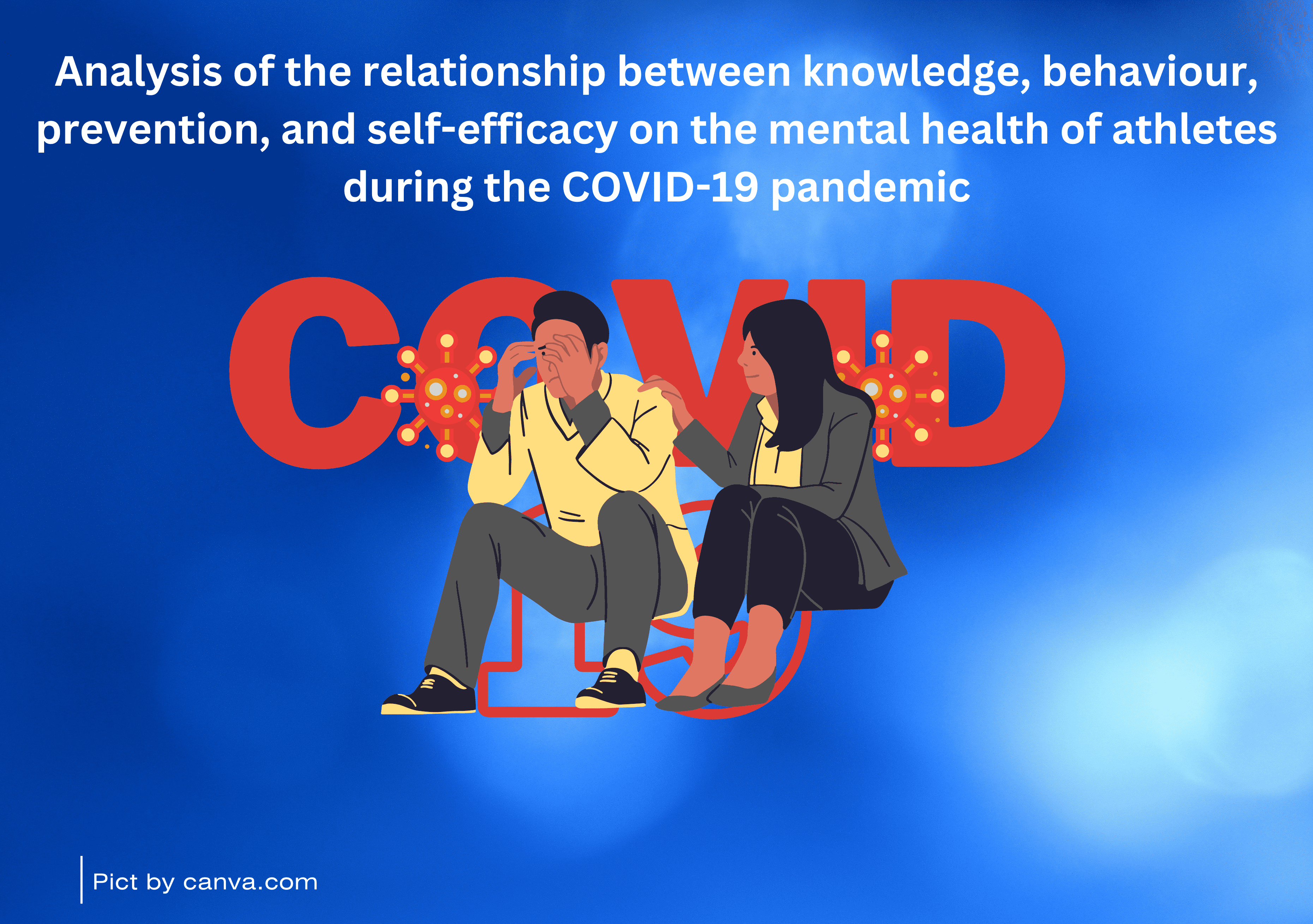Analysis of the relationship between knowledge, behaviour, prevention, and self-efficacy on the mental health of athletes during the COVID-19 pandemic
DOI:
https://doi.org/10.17977/um086v2i12024p7-16Keywords:
Knowledge, behavior, self-efficacy, football, Covid-19Abstract
Background: Mental health has become a trending topic during the pandemic. Many athletes have experienced decreased performance during the pandemic, but not a few athletes are able to control their mental health. Objective: The purpose of this study was to examine the relationship between knowledge, preventive behaviour, and self-efficacy on mental health in professional football athletes during the COVID-19 pandemic. This research uses quantitative methods. Methods: This type of research is observational with a cross-sectional study. Eighty professional football athletes were involved in this research. The sampling technique was carried out using a proportional stratified simple random sampling technique. This research was conducted by distributing questionnaires consisting of 4 parts, namely knowledge level questionnaire sheets, preventive behaviour questionnaire sheets, self-efficacy questionnaire sheets, and mental health questionnaire sheets. The data obtained in this study were analyzed using the SPSS application with a descriptive test method to determine the min, max, average, and percentage. Furthermore, data analysis was carried out using the Spearman test method. Results: Based on the results of the study, The low p-value of 0.046 and the correlation coefficient of -0.224 suggest a meaningful negative correlation between self-efficacy and mental health. This indicates that as self-efficacy increases, mental health tends to decrease among the respondents. Conclusion: There is a significant relationship between self-efficacy and the mental health of the respondents. We provide recommendations for Psychologists to develop online interventions that aim to increase individual ability to cope with stressors during a pandemic and reduce excessive perceptions that have a negative impact on mental health.
References
Abdel-Khalek, A. M., & Lester, D. (2017). The association between religiosity, generalized self-efficacy, mental health, and happiness in Arab college students. Personality and Individual Differences, 109, 12-16.
Al-Hanawi, M. K., Angawi, K., Alshareef, N., Qattan, A. M. N., Helmy, H. Z., Abudawood, Y., Alqurashi, M., Kattan, W. M., Kadasah, N. A., Chirwa, G. C., & Alsharqi, O. (2020). Knowledge, attitude and practice toward COVID-19 among the public in the Kingdom of Saudi Arabia: a cross-sectional study. Frontiers in public health, 8, 217.
Bandura, A. (1977). Self-efficacy: toward a unifying theory of behavioral change. Psychological review, 84(2), 191.
Bullard, J. (2022). Preparing for return to play: Understanding the impact of COVID-19 on the well-being of community college student-athletes. Community College Journal of Research and Practice, 46(3), 215-222.
Bullard, J., Dust, K., Funk, D., Strong, J. E., Alexander, D., Garnett, L., Boodman, C., Bello, A., Hedley, A., Schiffman, Z., Doan, K., Bastien, N., Li, Y., Caeseele, P. G. V., & Poliquin, G. (2020). Predicting infectious severe acute respiratory syndrome coronavirus 2 from diagnostic samples. Clinical infectious diseases, 71(10), 2663-2666.
Chan, J. F. W., Yuan, S., Kok, K. H., To, K. K. W., Chu, H., Yang, J., Xing, F., Liu, J., Yip, C. C. Y., Poon, R. W. S., Tsoi, H. W., Lo, S. K. F., Chan, K. H., Poon, V. K. M., Chan, W. M., Ip, J. D., Cai, J. P., Cheng, V. C. C., Chen, H., & Yuen, K. Y. (2020). A familial cluster of pneumonia associated with the 2019 novel coronavirus indicating person-to-person transmission: A study of a family cluster. The lancet, 395(10223), 514-523.
De Zwart, O., Veldhuijzen, I. K., Elam, G., Aro, A. R., Abraham, T., Bishop, G. D., Voeten, H. A. C. M., Richardus, J. H., & Brug, J. (2009). Perceived threat, risk perception, and efficacy beliefs related to SARS and other (emerging) infectious diseases: Results of an international survey. International journal of behavioral medicine, 16, 30-40.
De Zwart, O., Veldhuijzen, I. K., Richardus, J. H., & Brug, J. (2010). Monitoring of risk perceptions and correlates of precautionary behaviour related to human avian influenza during 2006-2007 in the Netherlands: results of seven consecutive surveys. BMC infectious diseases, 10, 1-15.
Gouttebarge, V., Aoki, H., & Kerkhoffs, G. M. (2018). Lower extremity osteoarthritis is associated with lower health-related quality of life among retired professional footballers. The Physician and Sportsmedicine, 46(4), 471-476.
Grix, J., Brannagan, P. M., Grimes, H., & Neville, R. (2021). The impact of Covid-19 on sport. International journal of sport policy and politics, 13(1), 1-12.
Guan, W. J., Ni, Z. Y., Hu, Y., Liang, W. H., Ou, C. Q., He, J. X., ... & Zhong, N. S. (2020). Clinical characteristics of coronavirus disease 2019 in China. New England journal of medicine, 382(18), 1708-1720.
Hossain, M. M., Tasnim, S., Sultana, A., Faizah, F., Mazumder, H., Zou, L., McKyer, E. L. J., Ahmed, H. U., & Ma, P. (2020). Epidemiology of mental health problems in COVID-19: A review. In F1000Research, 9.
Kasapoğlu, F. (2022). The relationship among spirituality, self-efficacy, COVID-19 anxiety, and hopelessness during the COVID-19 process in Turkey: A path analysis. Journal of religion and health, 61(1), 767-785.
Muslic, L., Buric, D. J., Markelic, M., & Milanovic, S. M. (2021). Mental health literacy. Socijalna Psihijatrija, 48(2020), 324-343. [Crossref]
Nurhasanah, N., Masitoh, S., Arianto, F., & Ayubi, N. (2022). Development of Android Application-Based Early Childhood Learning Devices (PAUDPEDIA) During the COVID-19 Pandemic. 16(09), 231–238.
Pillay, L., van Rensburg, D. C. C. J., van Rensburg, A. J., Ramagole, D. A., Holtzhausen, L., Dijkstra, H. P., & Cronje, T. (2020). Nowhere to hide: The significant impact of coronavirus disease 2019 (COVID-19) measures on elite and semi-elite South African athletes. Journal of science and medicine in sport, 23(7), 670-679.
Pillay, T., Cawthra, H. C., & Lombard, A. T. (2021). Integration of machine learning using hydroacoustic techniques and sediment sampling to refine substrate description in the Western Cape, South Africa. Marine Geology, 440, 106599.
Roy, D., Tripathy, S., Kar, S. K., Sharma, N., Verma, S. K., & Kaushal, V. (2020). Study of knowledge, attitude, anxiety & perceived mental healthcare need in Indian population during COVID-19 pandemic. Asian journal of psychiatry, 51, 102083.
Rubin, G. J., & Wessely, S. (2020). The psychological effects of quarantining a city. In The BMJ, 368, m313.
Setiati, S., & Azwar, M. K. (2020). COVID-19 and Indonesia. Acta Medica Indonesiana, 52(1), 84-89.
Van der Weerd, W., Timmermans, D. R., Beaujean, D. J., Oudhoff, J., & Van Steenbergen, J. E. (2011). Monitoring the level of government trust, risk perception and intention of the general public to adopt protective measures during the influenza A (H1N1) pandemic in the Netherlands. BMC public health, 11, 1-12.
Walsh, N. P., Gleeson, M., Shephard, R. J., Gleeson, M., Woods, J. A., Bishop, N. C., ... & Simon, P. (2011). Position statement part one: immune function and exercise. Exercise immunology review, 17.
Wang, C., Pan, R., Wan, X., Tan, Y., Xu, L., Ho, C. S., & Ho, R. C. (2020). Immediate psychological responses and associated factors during the initial stage of the 2019 coronavirus disease (COVID-19) epidemic among the general population in China. International journal of environmental research and public health, 17(5), 1729.
WHO. (2020). Who Covid-19. 28 Mei.
Xiang, Y. T., Yang, Y., Li, W., Zhang, L., Zhang, Q., Cheung, T., & Ng, C. H. (2020). Timely mental health care for the 2019 novel coronavirus outbreak is urgently needed. The Lancet Psychiatry, 7(3), 228-229.
Yıldırım, M., & Güler, A. (2022). COVID-19 severity, self-efficacy, knowledge, preventive behaviors, and mental health in Turkey. Death studies, 46(4), 979-986.
Zhou, P., Yang, X. Lou, Wang, X. G., Hu, B., Zhang, L., Zhang, W., Si, H. R., Zhu, Y., Li, B., Huang, C. L., Chen, H. D., Chen, J., Luo, Y., Guo, H., Jiang, R. Di, Liu, M. Q., Chen, Y., Shen, X. R., Wang, X., … Shi, Z. L. (2020). A pneumonia outbreak associated with a new coronavirus of probable bat origin. nature, 579(7798), 270-273.
Zu, Z. Y., Jiang, M. D., Xu, P. P., Chen, W., Ni, Q. Q., Lu, G. M., & Zhang, L. J. (2020). Coronavirus disease 2019 (COVID-19): a perspective from China. Radiology, 296(2), E15-E25.

Downloads
Published
How to Cite
Issue
Section
License
Copyright (c) 2024 Fahrial Amiq, Fidia Rizkiah Inayatilah, Prayogi Dwina Angga

This work is licensed under a Creative Commons Attribution-ShareAlike 4.0 International License.










